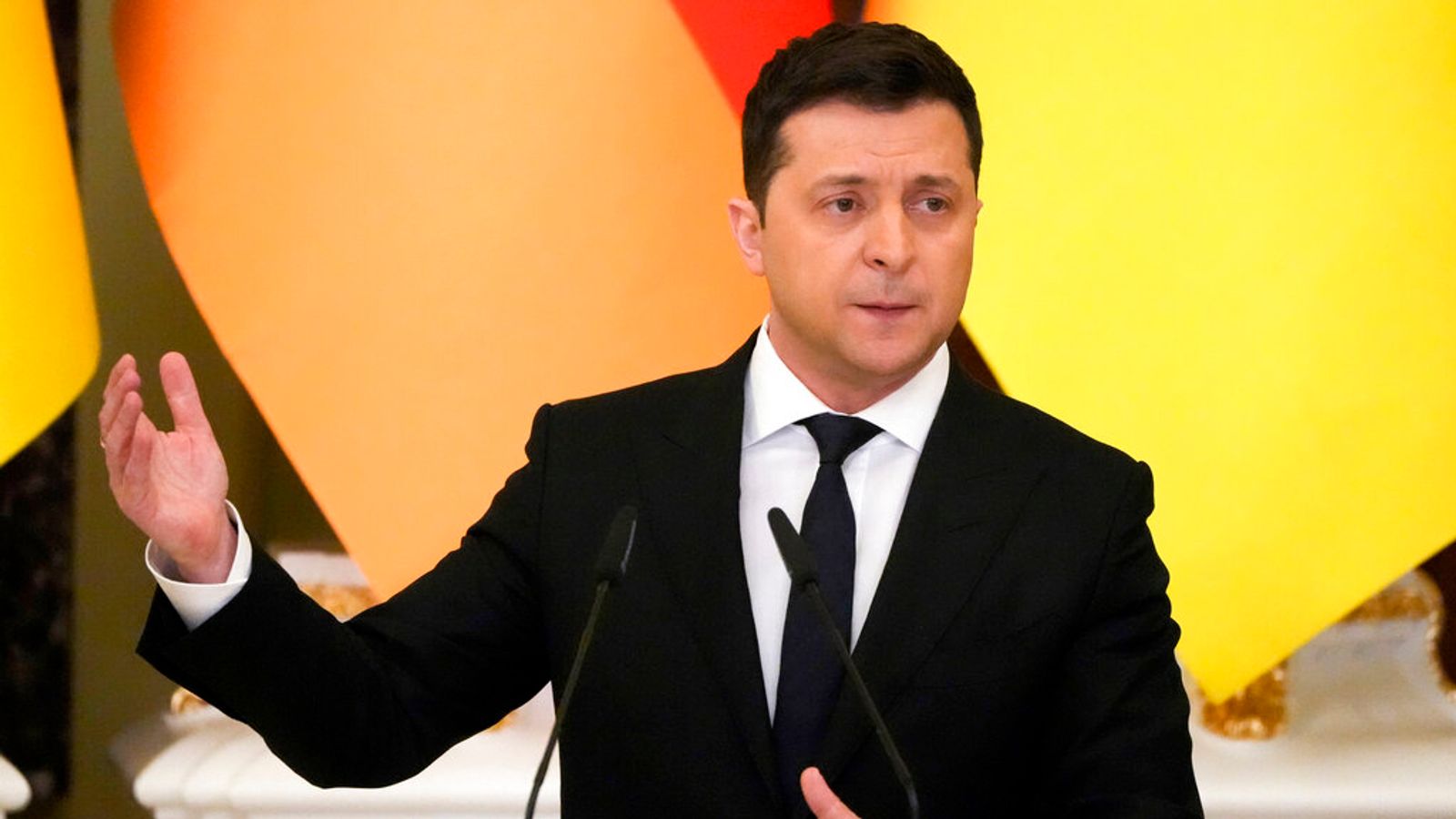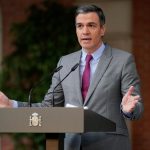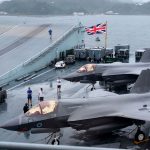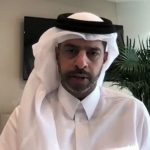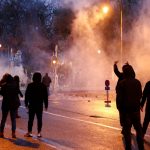Ukraine’s president has urged politicians and business leaders who have recently fled the country to return within 24 hours – telling them it is their “direct duty” to “stand side by side” with the Ukrainian people as fears grow of a Russian invasion.
Volodymyr Zelenskyy made a speech to the nation on Monday night ahead of a planned “day of unity” in Ukraine on Wednesday.
He addressed the country as Western officials believe the moment Russian President Vladimir Putin will order an attack on Ukraine is imminent.
In a message to politicians who have fled Ukraine during the crisis, Mr Zelenskyy said on Monday night: “I address separately all representatives of the state: civil servants, people’s deputies of all levels who have fled the country or plan to do so.
“The people of Ukraine have entrusted you not only to govern the state, but also to protect it. It is your direct duty in this situation to be with us, with the Ukrainian people. I urge you to return to your homeland within 24 hours and stand side by side with the Ukrainian army, diplomacy and people.”
Mr Zelenskyy also addressed business leaders who have left Ukraine “at the most crucial moment”, telling them: “Your strength is not in your money and planes, but in the civic position you can show.
“Return to your people and the country due to which you got your factories and wealth. Today, everyone passes a real test for a citizen of Ukraine. Pass it with dignity. Let everyone understand for whom Ukraine is really the homeland, and for whom it is just a platform for money-making.”
Russia-Ukraine crisis: Putin decision on whether to invade is ‘imminent’, West believes
Boris Johnson warns of ‘very, very dangerous’ situation in Ukraine amid Russia invasion fears
Ukraine crisis: ‘Whiff of Munich in the air’ – UK fears Russian invasion is ‘highly likely’ despite talks to avert war
Read more: Who are the key players in the Ukraine-Russia crisis?
In the speech, which was aired on Facebook, the Ukrainian president told his people war is being “systematically waged” against the county “on all fronts”.
He said: “On the military one, they increase the contingent around the border. On the diplomatic one, they are trying to deprive us of the right to determine our own foreign policy course. On the energy one, they limit the supply of gas, electricity and coal. On the information one, they seek to spread panic among citizens and investors through the media.”
His comments reference how Russia has amassed some 130,000 troops around Ukraine’s borders and off its coast, the biggest mobilisation of combat forces in Europe since the end of the Cold War in 1989.
On the diplomatic front, Mr Zelenskyy was referring to how Moscow is working to prevent Ukraine from joining NATO.
The Ukrainian president tried to comfort his people by saying that despite the threats it is facing, the country’s army is “many times stronger than eight years ago”, when Russia invaded and annexed the Crimea region in 2014.
Read more: What are the Minsk agreements and how could they help avert a Russian invasion?
Mr Zelenskyy later said Ukraine will mark a “day of unity” on Wednesday – in an apparent swipe at media reports in the country which suggested Russia will invade that day.
He had earlier urged Ukrainian journalists to “work for Ukraine” and not the media owners who have “already fled their own country”.
Another day of predicting the workings of Vladimir Putin’s mind. Another day of trying to work out who is bluffing.
Will Putin engage in diplomacy and back down? Or was his plan always to make undeliverable demands of the West as a pretext to invade?
His foreign minister told him from one end of a long table in the Kremlin that diplomacy still has road to run. “Good,” the Russian President replied. A bluff, televised for us all to see? Or, is America’s assessment that Putin will invade on Wednesday the bluff?
In the State Department today the chat was of denying the ability for Putin to create a ‘false flag’ – attacking his own side, blaming it on the other side, then using that as an excuse to invade.
The most dramatic news of the day was the announcement of the closure of the US embassy in Kyiv and its relocation to the western city of Lviv.
The State Department spokesman said they have “standard protocols” when I asked if they were destroying sensitive items they couldn’t take.
Surely this is a solid signal that America really does think an invasion is imminent? Or is it just prudence after Afghanistan and the prospect, even a remote one, of a face-off between US marines and Russian troops?
Of the analysts and diplomats I talk to behind the scenes in Washington and Moscow, there are varied assessments. The closer you probe to Kyiv and Moscow, the more you hear from people that an invasion won’t happen.
In real time, we’re watching American, European and Russian posturing and statecraft play out. It’s complex diplomacy with a good dose of misinformation from both sides, no doubt, each trying to expose the other.
Bluff, counter bluff. Truth and disinformation. This could end horribly this week or run for many months.
Mr Zelenskyy said people will “hoist national flags, put on blue and yellow ribbons and show the world our unity” on Wednesday.
The Ukrainian leader’s speech comes after Boris Johnson and Joe Biden warned any incursion into Ukraine would result in a “protracted crisis” for Moscow with “far-reaching damage for both Russia and the world”.
The UK prime minister and the US president held a 40-minute phone call on the crisis, and called on Western allies to “remain united in the face of Russian threats”.
Please use Chrome browser for a more accessible video player
According to a Downing Street readout of their conversation, the pair agreed there would be a “significant package of sanctions should Russian aggression escalate”.
But they also said there remained a “crucial window for diplomacy” with Russia and a chance for Moscow to “step back from its threats” towards Ukraine.
The call came after Mr Johnson said there was “pretty clear” evidence that Russia was planning an invasion.
Please use Chrome browser for a more accessible video player
The prime minister has warned that a Russian assault could be launched within 48 hours, describing it as a “very, very dangerous and difficult situation” that has left the world “on the edge of a precipice”.
If a large-scale invasion were to occur it would likely be fast and deadly with missiles launched from the sea against the Ukrainian capital Kyiv and ground troops cutting off Ukraine’s most capable armed forces based in the east of the country, according to Western assessments.
Mr Johnson and Mr Biden also reiterated the need for European countries to reduce their dependence on Russian gas, “a move which, more than any other, would strike at the heart of Russia’s strategic interests”, according to a Downing Street spokesman.
